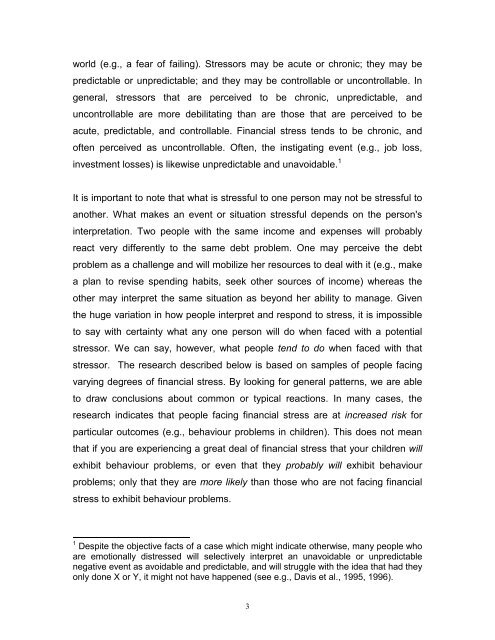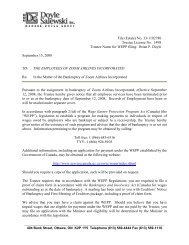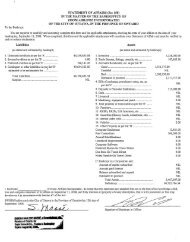Download the Carleton University Report (PDF). - Doyle Salewski Inc
Download the Carleton University Report (PDF). - Doyle Salewski Inc
Download the Carleton University Report (PDF). - Doyle Salewski Inc
Create successful ePaper yourself
Turn your PDF publications into a flip-book with our unique Google optimized e-Paper software.
world (e.g., a fear of failing). Stressors may be acute or chronic; <strong>the</strong>y may be<br />
predictable or unpredictable; and <strong>the</strong>y may be controllable or uncontrollable. In<br />
general, stressors that are perceived to be chronic, unpredictable, and<br />
uncontrollable are more debilitating than are those that are perceived to be<br />
acute, predictable, and controllable. Financial stress tends to be chronic, and<br />
often perceived as uncontrollable. Often, <strong>the</strong> instigating event (e.g., job loss,<br />
investment losses) is likewise unpredictable and unavoidable. 1<br />
It is important to note that what is stressful to one person may not be stressful to<br />
ano<strong>the</strong>r. What makes an event or situation stressful depends on <strong>the</strong> person's<br />
interpretation. Two people with <strong>the</strong> same income and expenses will probably<br />
react very differently to <strong>the</strong> same debt problem. One may perceive <strong>the</strong> debt<br />
problem as a challenge and will mobilize her resources to deal with it (e.g., make<br />
a plan to revise spending habits, seek o<strong>the</strong>r sources of income) whereas <strong>the</strong><br />
o<strong>the</strong>r may interpret <strong>the</strong> same situation as beyond her ability to manage. Given<br />
<strong>the</strong> huge variation in how people interpret and respond to stress, it is impossible<br />
to say with certainty what any one person will do when faced with a potential<br />
stressor. We can say, however, what people tend to do when faced with that<br />
stressor. The research described below is based on samples of people facing<br />
varying degrees of financial stress. By looking for general patterns, we are able<br />
to draw conclusions about common or typical reactions. In many cases, <strong>the</strong><br />
research indicates that people facing financial stress are at increased risk for<br />
particular outcomes (e.g., behaviour problems in children). This does not mean<br />
that if you are experiencing a great deal of financial stress that your children will<br />
exhibit behaviour problems, or even that <strong>the</strong>y probably will exhibit behaviour<br />
problems; only that <strong>the</strong>y are more likely than those who are not facing financial<br />
stress to exhibit behaviour problems.<br />
1 Despite <strong>the</strong> objective facts of a case which might indicate o<strong>the</strong>rwise, many people who<br />
are emotionally distressed will selectively interpret an unavoidable or unpredictable<br />
negative event as avoidable and predictable, and will struggle with <strong>the</strong> idea that had <strong>the</strong>y<br />
only done X or Y, it might not have happened (see e.g., Davis et al., 1995, 1996).<br />
3





